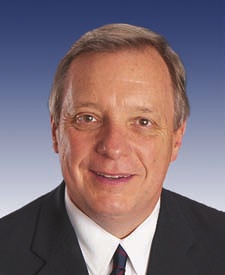 In the latest skirmish in the nine-year legal battle over interchange fees, Wal-Mart, 7-Eleven and other retailers, joined by Senate Majority Whip Richard Durbin (D-Ill.), have filed several briefs with the U.S. Supreme Court seeking to change the Federal Reserve's cap on debit card interchange fees that took effect three years ago.
In the latest skirmish in the nine-year legal battle over interchange fees, Wal-Mart, 7-Eleven and other retailers, joined by Senate Majority Whip Richard Durbin (D-Ill.), have filed several briefs with the U.S. Supreme Court seeking to change the Federal Reserve's cap on debit card interchange fees that took effect three years ago.
The group contended that the interchange fee cap was set higher than Congress intended when it passed the Dodd-Frank Consumer Protection and Wall Street Reform Act of 2010, according to court documents and sources involved in the case.
Wal-Mart and 7-Eleven, which opted out of the $7 million antitrust settlement with Visa and MasterCard, filed separate amicus briefs the week of Sept. 22, arguing the Fed misinterpreted the legislation's intent and the fee cap should be lowered, Jeffrey Shinder, the attorney who represents 7-Eleven and a group of small ticket merchants involved in the litigation, said.
Recommended For You
In July, U.S. District Court Judge John Gleeson ruled that Wal-Mart and other retailers displeased with the settlement could continue with new litigation.
Shinder told CU Times his clients believed the Fed twisted the law to empower a price increase for all regulated debit transactions below certain thresholds.
"MasterCard has described small ticket transactions as the holy grail of debit growth and very soon the majority of debit transactions will be made for $15 or less," Shinder, a managing partner of Constantine Cannon's New York City office, said.
"As a result, this flaw in the Federal Reserve's analysis threatens to subvert the entire purpose of the law," he continued. "Because of the Federal Reserve's legally flawed rulemaking the price of what very soon will be the majority of the debit volume in this country will be higher with the regulations than it would have been without it. Nothing better reflects the arbitrary and capricious nature of the Fed rulemaking than that."
Randy Hargrove, director of national media relations for Wal-Mart, told CU Times that the mega retailer is hoping the interchange issue can be resolved in a manner that benefits consumers.
"Congress passed the Durbin Amendment to reduce debit card expenses significantly for consumers," he said. "Unfortunately, the regulations adopted by the Federal Reserve and approved by the D.C. Circuit have fallen short of the amendment's goals and set interchange fees on debit transactions higher than they legally should be. We hope the Supreme Court will side with our customers and require new regulations that result in lower debit card expenses."
Wal-Mart led a class of retailers that won a $3 billion settlement with Visa and MasterCard over different antitrust claims in 2004. In the current litigation, Durbin filed a friend-of-the-court brief filed the week of Sept. 22 in support of the National Retail Federation and other retailers. He claimed the 21-cent cap set in 2011 goes beyond the "reasonable and proportional" level mandated by Congress under the Durbin amendment.
The amendment was carefully crafted to respond to collusion, market failures and excessive fees within the electronic debit system, but the D.C. Circuit Court erred by deferring to the inclusion of "third category" bank costs in its rulemaking, according to Durbin's brief. The inclusion of such costs was contrary to the Durbin Amendment's text and legislative history;
"Unfortunately, the board's final rulemaking failed to sufficiently follow the text and purpose of the law," according to the brief. "Because interchange fees are ultimately borne by consumers in the form of higher retail prices, consumers have suffered as a result."
In September, the Fed announced that it does not plan to revise the interchange fee standard or the fraud-prevention adjustment. A Sept. 18 report issued by the Fed noted that debit swipe fees totaled $16.3 billion last year, down from about $20 billion in 2012.
According to EFTA provisions, interchange fees should not exceed 21 cents plus five basis points multiplied by the value of the transaction, plus a one cent fraud prevention adjustment, if eligible. However, the fee cap does not apply to debit card issuers with consolidated assets of less than $10 billion, which included most credit unions.
© Touchpoint Markets, All Rights Reserved. Request academic re-use from www.copyright.com. All other uses, submit a request to [email protected]. For more inforrmation visit Asset & Logo Licensing.






